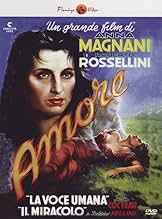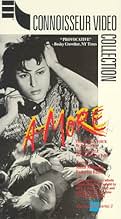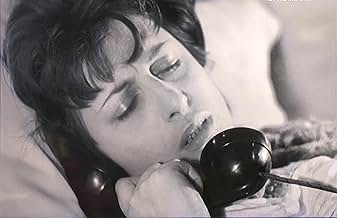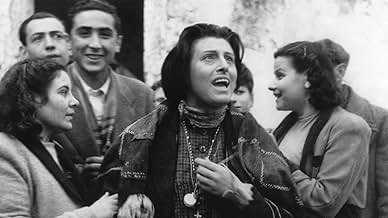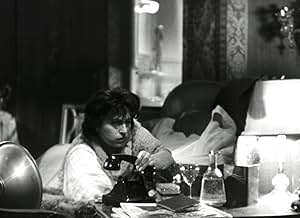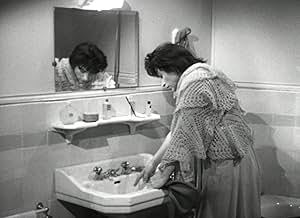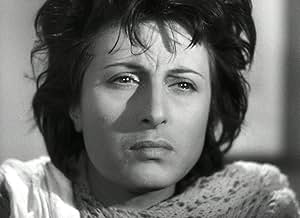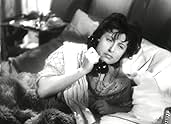L'amore
- 1948
- 1h 9m
ÉVALUATION IMDb
6,9/10
2,1 k
MA NOTE
Ajouter une intrigue dans votre langueIn part one, a heartbroken woman talks to her ex-lover on the phone. In part two, a pregnant woman believes she is carrying the child of Saint Joseph.In part one, a heartbroken woman talks to her ex-lover on the phone. In part two, a pregnant woman believes she is carrying the child of Saint Joseph.In part one, a heartbroken woman talks to her ex-lover on the phone. In part two, a pregnant woman believes she is carrying the child of Saint Joseph.
- Prix
- 2 victoires et 2 nominations au total
Avis en vedette
It has been noted elsewhere that this film is a fine indicator of Italian filmmakers' rupture with Neorealism, and how (in the second segment) they often turned to satire and the grotesque, a liking they shared with Spanish colleagues. "Una voce umana", the first segment, based on Jean Cocteau's 1930 monologue, about a woman who resists to break up with a man on the telephone, is the weakest part, not because of the text, Rossellini's direction or Magnani's performance. For me the problem is that the lady in question is anything but in love. She is obssessed and crazed, and after a few minutes, her addiction turns tiresome. Magnani tries had, Rossellini moves her all around the apartment, but she awakens little compassion.
Then there is "Il miracolo", from an idea by Federico Fellini (no proof has been found that it was plagiarized from a text by Ramón María del Valle Inclán, a master of the grotesque), in which Nanni, a beggar, is seduced by a traveler, and the poor woman assumes her pregnancy as a divine design. The segment created a little scandal in the United States in the 1950s, as it happened years later with "The Last Temptation of Christ", but today no Catholic hypocrit would think of raising an inquisitive voice over Nanni's sad story.
It is a nice job for in Rossellini's evolution as an author and another demonstration of la Magnani's art, but other than that it's an overrated minor work.
Then there is "Il miracolo", from an idea by Federico Fellini (no proof has been found that it was plagiarized from a text by Ramón María del Valle Inclán, a master of the grotesque), in which Nanni, a beggar, is seduced by a traveler, and the poor woman assumes her pregnancy as a divine design. The segment created a little scandal in the United States in the 1950s, as it happened years later with "The Last Temptation of Christ", but today no Catholic hypocrit would think of raising an inquisitive voice over Nanni's sad story.
It is a nice job for in Rossellini's evolution as an author and another demonstration of la Magnani's art, but other than that it's an overrated minor work.
Two short stories about love: the first, based on a Jean Cocteau story, is a powerful sola tour-de-force by the great actress Anna Magnani; it's always hard to pull off an one-set, one-person monologue on the screen successfully, but she does it. The second, based on what can only euphemistically be called a "story" (mostly shots of Magnani walking) by Frederico Fellini, is rambling nonsense; unfortunately, it is also longer than the first episode, and also has nothing really to do with the topic of the title - it does not belong here. *** out of 4 for the first episode, * for the second, ** on average.
After the opening credits we see a title that says "This film is an homage to the art of Anna Magnani" and that's exactly what this powerful Rossellini film is about. Magnani dominates both sections of "L'Amore" and is quite remarkable. In the first section which is called "Una Voce Umana"(The Human Voice), Magnani plays a woman in her bedroom who makes a desperate telephone call with her former husband. It is mostly comprised of close-ups of Magnani's grieving face, anticipating those of Rossellini's films starring Ingrid Bergman. In the second section, "Il Maracolo"(The Miracle), Magnani is a peasant who meets and is seduced by a vagabond whom she thinks is Saint Joseph. Though the villagers incessantly ridicule her, she thinks is pregnant with a Christ baby, something that angered the censors and religious groups, ultimately dubbing as "blasphemous". "The Miracle" section is by far the most powerful and provocative". It is characterized by overt Christian symbolism and some gorgeous shots of the countryside. Rossellini makes the viewer aware of the overpowering presence of the environment, itself another character. The scenes where Magnani is lying on the ground surrounded by animals are particularly ravishing and beautiful.
L'Amore is divided into two parts, the first called "A Human Voice", and the second named "The Miracle". Anna Magnani is wonderful at both. The first episode is about love and sadness. A woman is pursuing for a man who does not love her any longer. The whole episode occurs whitin a bedroom, with Anna and a telephone. The dialogue of Anna with her ex-husband is simply fantastic and very emotive. The second episode, more cryptic and stronger, shows us a medieval Italian town with all its beliefs and supersticions. A woman, Anna Magnani again, makes remember us the mistery of creation, with symbolic references to some christian icons (as virgins, poor people, saints, etc.). In sum, this is a wonderful film.
When it was scheduled to be shown in New York, L' Amore was protested by religious leaders led by Cardinal Francis Spellman. The film board of New York quickly yanked it before even hitting the screen. After viewing this case, the Supreme Court ruled that for the first time that films are "a significant medium for the communication of ideas." It wasn't until this point that the First Amendment covered film as a freedom of speech. This didn't stop censorship, but it did open new doors.
Le saviez-vous
- AnecdotesWhen, in 1952, the "Il Miracolo" segment of the film was released in the United States as "The Miracle", it was the subject of a legal battle in which the Supreme Court ruled for the first time that motion pictures, like books and newspapers, were protected under the First Amendment to the Constitution.
- Citations
La donna al telefono (segment "Una voce umana"): What? My black satin dress. Yes, I'm still wearing it. No, I didn't smoke. Just three cigarettes. I swear
- ConnexionsEdited into Histoire(s) du cinéma: Une histoire seule (1989)
Meilleurs choix
Connectez-vous pour évaluer et surveiller les recommandations personnalisées
- How long is Love?Propulsé par Alexa
Détails
- Durée
- 1h 9m(69 min)
- Couleur
- Rapport de forme
- 1.37 : 1
Contribuer à cette page
Suggérer une modification ou ajouter du contenu manquant

